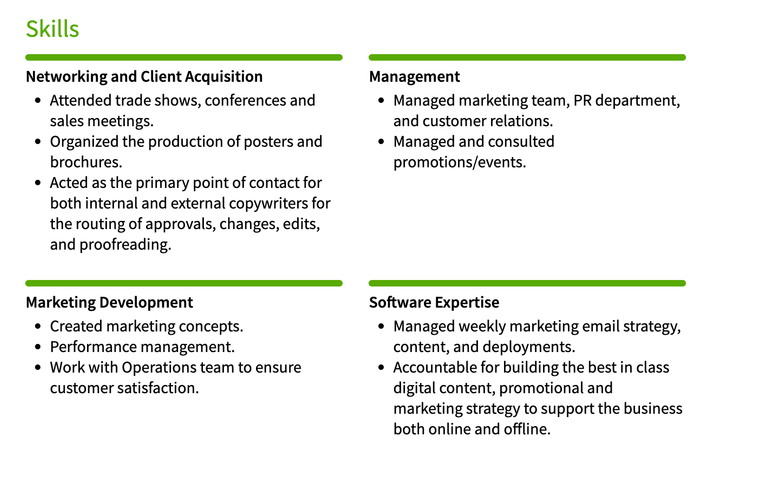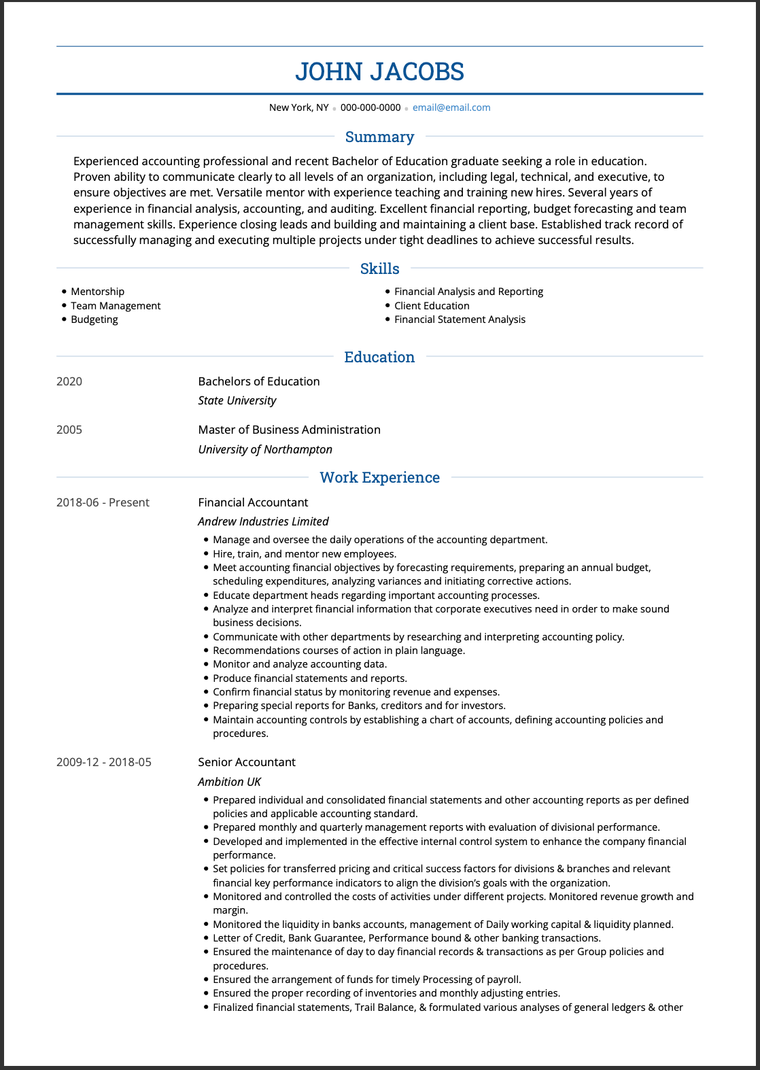
Career Change Resume: Examples, How to Write, and Other Tips To Support Your Career Transition

When you make the difficult choice to look for a job in a new industry, it’s important to write a career change resume.
Your old resume, tailored to your old career, won’t suit your new field. For your job search to succeed when you make a career change, you have to make sure that your resume is tailored to the right positions and highlights the right skills.
Important steps for writing a career change resume include:
- Picking the right resume format
- Highlighting transferrable skills
- Tailoring your resume to suit your new industry
- Emphasizing your most relevant experience
Anyone can reach a crossroads in their profession and decide that it's time to make a change. Maybe you've developed new skills, run out of opportunities, or realized that your current career doesn't motivate you like it once did. Whatever the reason, if you want to change jobs, you will need to know how to write a resume for a career change.
What is a Career Change Resume?
A career change resume is a resume specifically designed and written to explain a career transition. From the objective to the mentioned skills, everything highlights the transferability of past experiences and skills to a new job.
Let’s say, you are a marketer who is trying to transition to a project management position. If you send over a generic resume that lists your marketing skills and experience - it would leave the hiring manager confused to see your resume.
If there’s no explanation of why you are even applying for a job, you would be rejected as the hiring manager would assume you are randomly applying for jobs.
Why Write a Career Change Resume?
A career change resume better connects your professional work experience and skills to a job when you are applying for either a new job or entering a new industry. You stand out as an applicant as it makes it extremely easy to see relevant past experience and skills that you have is relevant to the job you are applying for.
In our example of marketing to project management career transition, without a career transition resume a hiring manager would not understand:
- Why do you want to apply for this role?
- What relevant skills do you bring to this role?
- What past experience do you have that’s relevant to this role?
Now, some assume that the HR or hiring manager is going to read through their resume and extract the right information. But that in 2023 is a big mistake. No one is going to take the time to read through your resume when there’s no explanation to support the questions above.
But let’s say you did the following to show your marketing management skills are relevant to the project management skills:
- Highlighted how you did planning, organizing, and execution of projects along with timeline management and
- Showcase how your collaboration skills for marketing project management required you to foster collaboration with stakeholders and other employees.
- If you practice agile, scrum, etc highlight that and show how you improved project management through tactical changes (e.g. story points to iteratively improve epics).
The career change resume tips alone make a big difference. But, the real difference maker is how you show relevance for the role through each individual section and your resume layout as well. A good starting point would be to understand how to write a career transition resume.
How to Write a Career Change Resume
To write a career change resume and explain your career transition better, follow these steps:
- Select the right career change resume format. Reverse chronological isn’t the best choice here. We recommend selecting either a functional or a hybrid resume format.
- While writing your resume header, instead of your current job title, write something like “Entry-level {job title}” to show relevance.
- Write an objective instead of a resume summary and mention that you are changing careers in it.
- While listing your work experience, reduce the focus on non-relevant job responsibilities and achievements. Increase focus on relevant responsibilities and achievements. Go as far as removing irrelevant ones. Do this for each job you apply for.
- The skill section of your resume should be changed based on what skills the job actually needs. And, do it for all jobs.
- Highlight relevant education or certifications in your resume.
- At the end, your resume should support your intent to transition in the new role from top to down.
Now that we have looked into how to write a career transition resume, let’s look into each of these in depth.
The Right Career Change Resume Format
There are three resume formats that you can consider for a career change resume.
- Functional: This format emphasizes skills above work experience, and groups past positions by topic rather than chronologically.
- Combination: This format emphasizes your skills, but still uses a reverse-chronological work history section.
The third resume format is reverse chronological resume format, but we don't advise to use it for you career transition.
We recommend using a combination format for a career change resume. This resume format allows you to showcase your skills while maintaining a clear timeline of your career.
To write a combination resume, create a Skills section near the top of your resume, above your Work Experience section. This is where you can highlight and explain your most impressive and most relevant skills. Your Skills section will be the focus of your resume, as this section is where you can make the case for your skill set, even if your past positions were in a different field.
Your Work Experience section will follow your Skills section. This section can be shorter than in a typical reverse-chronological resume, with less detail than your Skills section, but it should still have a clear timeline. Even if you are changing industries, hiring managers will be interested to see how your career has progressed. A reverse-chronological work experience section allows you to clearly tell that part of your story.
Of course, these aren’t hard and fast rules. You can use a typical reverse-chronological resume format if you prefer. Just make sure you can highlight the right skills and experience for your new industry.
Selecting the Right Career Transition Resume Template
Any resume for changing careers needs a great template.
Your resume won’t do you any good if it’s difficult to read, no matter how well-targeted your skill set is. Make sure your resume is easy to read, with simple organization and clear headings.
Additionally, ensure that you choose a resume template suited for the industry you want to work in.
If you want to move into a more formal industry, like law or accounting, find a traditional resume template with simple formatting and no colours. If you are moving into a more creative field, like marketing or design, you can look for a more modern template, with pictures or colours.
To find the perfect resume template for your new career, check out these VisualCV resume templates.
What to Add in Your Career Change Resume Header
Your career change resume should begin with your name and contact information. The hiring manager needs this information to contact you, so you should make it easy to find.
Your resume header should include:
- Name
- Prospective job title
- Phone number
- Email address
- City of residence
You can also include hyperlinks to your professional online profiles, such as LinkedIn or Twitter. If you’re applying for a software development position, you can link to your GitHub profile. If you are moving into a creative field, you might have an online portfolio to link to.

You may also want to include a headline or job title in this section. However, if you are changing careers, this could confuse the hiring manager. Avoid using a job title that isn’t supported by your resume.
Write an Objective instead of Summary for Career Change Resume
A resume summary fails to explain career transition.
For example, consider this resume summary below of a marketer applying for a project management role: Results-driven marketing professional with extensive experience in developing and implementing successful marketing strategies. Demonstrated expertise in brand management, digital marketing, and campaign execution, driving revenue growth and customer engagement.
The candidate would be rejected right away as the hiring manager would find it difficult to understand why this candidate is even apply for a PM job.
Now, let's use an objective instead of summary to better explain career transition.
Career Change Resume Objective Example
Aspiring project management professional with a proven track record of successfully leading and executing complex projects. Skilled in strategic planning, cross-functional collaboration, and delivering results that drive business growth and exceed client expectations.
Notice how this objective better explains career transition here by:
- Clearly stating that the applicant is aspiring to become a project management professional.
- Shifting the focus towards past work experience and achievements relevant to project management.
This would compel a hiring manager to read further dive deeper into your past work experience and skills.
Highlight your transferrable skills
Your Skills section is the key to your career change resume. Your past roles may not be directly relevant to positions in your new industry, so your Skills section is where you will need to demonstrate that you have what it takes to succeed.
To identify the skills you will need in future roles, study job postings in your new industry, network with professionals in that field, and learn as much as you can before you start applying.
Then, look back on your career and think about the skills you've developed. Some of them will be relevant to the new industry, and will be perfect for your career change resume.
By reading as much as you can about your target profession and brainstorming your existing skills, you should be able to figure out which transferrable skills to highlight. These may be soft skills like leadership, teamwork, creativity, or problem-solving, or hard skills like writing, software expertise, or bookkeeping. Identifying transferrable skills is the key to a successful career change resume.
Once you’ve settled on the right transferrable skills, think about the best way to showcase them. It may be that a simple list will do the trick. If this is the case, create a simple bulleted list for your most relevant and impressive skills.

To really sell your skills, however, you may want place more emphasis on the skills section. Make each skill in the list a heading, and then provide evidence for each skill in bullet points below. The best way to do this is to give concrete, measurable examples of achievements relevant to that skill.
For example, if you count Leadership as a transferrable skill, provide examples of projects you have led, teams you have managed, or decisions you have been responsible for.
Clear, concrete examples are the best way to showcase your skills. When your skills are the focus of your resume, as they will be in a career change resume, it’s important to give your Skills section the attention it deserves.
Career change resume example skills section
Skills
- Leadership
- Time Management
- Creativity
- Problem-Solving
- Adaptability
- Communication
- Analytics
- Teamwork
- Project Management
- Budgeting
How to Support Career Change through Resume Work Experience Section
- Use numbers and measurable successes as much as possible. For example, if you worked in sales in a previous job, give your sales revenue or the number of clients you gained. This approach makes your claims more concrete and impressive.
- Use action words to describe your duties. Terms like accelerated, spearheaded, generated, centralized, and mentored can add some energy to your work experience section and make your roles sound impressive.
- Emphasize any transferrable skills. Your resume should be focused on your next job, including when you describe past ones.
- Make it clear to the hiring manager that you have the skills to succeed in the new industry.
In each job description, be sure to focus on the accomplishments that could be relevant to your new industry. Think about the requirements listed in the job posting, and consider what employers in your new field are seeking. Every job may not be perfectly relevant, but it’s important to show that even though you are changing careers, you have what it takes to be successful in a challenging role.
Career Change Resume Work Experience Example
Researcher ABC Labs, New York Sept 2018 - Present
- Instrumental part of a team that completed government-funded research on Alzheimer’s Disease, resulting in a second phase project funding of $5 million
- Managed and coordinated a 200-person volunteer research program that examined neurological diseases
- Conducted in-depth research to understand the current state of medications and their efficacy for Alzheimer’s Disease
- Collaborated on data analysis and contributed to research paper on progressive neurological disorders
- Presented findings at three annual conferences
- Wrote monthly press releases to update the public about our work and findings
How to List Education on a Career Change Resume
Your education is an important part of your career story. You should list your any degrees, diplomas, and certificates in your resume, even if they aren’t immediately relevant to your desired field. It’s important to show that you can work towards a goal and complete a degree, even if that degree is in an unrelated field.
If your education is completely irrelevant, simply listing your degrees and the institution name is sufficient.
If you would like to give your education more emphasis, however, you can give more details. For example, you may want to give your GPA, list academic awards, or describe relevant projects or areas of study.
Example of a Career Change Resume Education Section
MSc in Mechanical Engineering University of Iowa
Modules:
- Project Management
- New Product Development
- Advanced CAD
- Advanced Static Analysis
BSc in Mechanical Engineering University of Iowa
GPA: 3.7
Modules:
- Project Management
- Engineering Concepts
- Systems modelling
- Material analysis
Customize your Career Change resume for every application
You should customize your resume for every application.
While this is true for any resume, it is especially true for a career change resume. Your resume has to be perfectly targeted to prove that you have the right skills not only for a new job, but for a new career.
To do this, study each job posting and identify the specific keywords that the company is using. They will be looking for specific skills and experience. Then, look at your own background and identify the skills that overlap, and use the same words or phrases to describe your skills. This will ensure that the keywords match, and get your resume to the next round.
Career change resume example
Summary
Experienced accounting professional and recent Bachelor of Education graduate seeking a role in education. Proven ability to communicate clearly to all levels of an organization, including legal, technical, and executive, to ensure objectives are met. Versatile mentor with experience teaching and training new hires. Several years of experience in financial analysis, accounting, and auditing. Excellent financial reporting, budget forecasting and team management skills. Experience closing leads and building and maintaining a client base. Established track record of successfully managing and executing multiple projects under tight deadlines to achieve successful results.
Skills
- Mentorship
- Team Management
- Budgeting
- Financial Analysis and Reporting
- Client Education
- Financial Statement Analysis
Education
Bachelors of Education State University
Master of Business Administration University of Northampton
Work Experience
Financial Accountant Andrew Industries Limited
- Manage and oversee the daily operations of the accounting department.
- Hire, train, and mentor new employees.
- Meet accounting financial objectives by forecasting requirements, preparing an annual budget, scheduling expenditures, analyzing variances and initiating corrective actions.
- Educate department heads regarding important accounting processes.
- Analyze and interpret financial information that corporate executives need in order to make sound business decisions.
- Communicate with other departments by researching and interpreting accounting policy.
- Recommendations courses of action in plain language.
- Monitor and analyze accounting data.
- Produce financial statements and reports.
- Confirm financial status by monitoring revenue and expenses.
- Preparing special reports for Banks, creditors and for investors.
- Maintain accounting controls by establishing a chart of accounts, defining accounting policies and procedures.
Senior Accountant Ambition UK
- Prepared individual and consolidated financial statements and other accounting reports as per defined policies and applicable accounting standard.
- Prepared monthly and quarterly management reports with evaluation of divisional performance.
- Developed and implemented in the effective internal control system to enhance the company financial performance.
- Set policies for transferred pricing and critical success factors for divisions & branches and relevant financial key performance indicators to align the division’s goals with the organization.
- Monitored and controlled the costs of activities under different projects. Monitored revenue growth and margin.
- Monitored the liquidity in banks accounts, management of Daily working capital & liquidity planned.
- Letter of Credit, Bank Guarantee, Performance bound & other banking transactions.
- Ensured the maintenance of day to day financial records & transactions as per Group policies and procedures.
- Ensured the arrangement of funds for timely Processing of payroll.
- Ensured the proper recording of inventories and monthly adjusting entries.
- Finalized financial statements, Trail Balance, & formulated various analyses of general ledgers & other documents for submission to external auditors.
- Participated in various internal audit reviews in the Group as directed by Group Chief Financial officer.

- What is a Career Change Resume?
- Why Write a Career Change Resume?
- How to Write a Career Change Resume
- The Right Career Change Resume Format
- Selecting the Right Career Transition Resume Template
- What to Add in Your Career Change Resume Header
- Write an Objective instead of Summary for Career Change Resume
- Highlight your transferrable skills
- Customize your Career Change resume for every application
- Career change resume example

Written By
Ben Temple
Community Success Manager & CV Writing Expert
Ben is a writer, customer success manager and CV writing expert with over 5 years of experience helping job-seekers create their best careers. He believes in the importance of a great resume summary and the power of coffee.

We live in a world where working as a freelancer is easier than ever. An Internet connection alone makes it possible for an artist to land a gig designing a logo for a company on the other side of the planet or a writer producing marketing copy from a coffee shop.
November 11, 2015
Read Post

Co-Founder & Director

The top hiring and human resource statistics for 2024, including data on AI resumes, job interviews, remote work, and recruiting.
September 7, 2024
Read Post

Community Success Manager & CV Writing Expert

This guide will prepare you to change careers past 30. It's never too late for a great career!
July 12, 2022
Read Post

Content Writer + Resume Expert
Copyright ©2024 Workstory Inc.